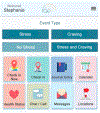Realize, Analyze, Engage (RAE): A Digital Tool to Support Recovery from Substance Use Disorder
- PMID: 33748430
- PMCID: PMC7978415
- DOI: 10.20900/jpbs.20210002
Realize, Analyze, Engage (RAE): A Digital Tool to Support Recovery from Substance Use Disorder
Abstract
Background: Substance use disorders are a highly prevalent group of chronic diseases with devastating individual and public health consequences. Current treatment strategies suffer from high rates of relapse, or return to drug use, and novel solutions are desperately needed. Realize Analyze Engage (RAE) is a digital, mHealth intervention that focusses on real time, objective detection of high-risk events (stress and drug craving) to deploy just-in-time supportive interventions. The present study aims to (1) evaluate the accuracy and usability of the RAE system and (2) evaluate the impact of RAE on patient centered outcomes.
Methods: The first phase of the study will be an observational trial of N = 50 participants in outpatient treatment for SUD using the RAE system for 30 days. Accuracy of craving and stress detection algorithms will be evaluated, and usability of RAE will be explored via semi-structured interviews with participants and focus groups with SUD treatment clinicians. The second phase of the study will be a randomized controlled trial of RAE vs usual care to evaluate rates of return to use, retention in treatment, and quality of life.
Anticipated findings and future directions: The RAE platform is a potentially powerful tool to de-escalate stress and craving outside of the clinical milieu, and to connect with a support system needed most. RAE also aims to provide clinicians with actionable insight to understand patients' level of risk, and contextual clues for their triggers in order to provide more personalized recovery support.
Keywords: craving; digital diagnostics; digital health; digital therapeutics; mHealth; stress; substance use disorder; wearable.
Conflict of interest statement
CONFLICTS OF INTEREST Megan Reinhardt is the CEO of RAE Health and Nicole Gilbertson is the COO of RAE Health. They represent the small business partners in this small business innovation research award.
Figures
Similar articles
-
Towards Device Agnostic Detection of Stress and Craving in Patients with Substance Use Disorder.Proc Annu Hawaii Int Conf Syst Sci. 2023;2023:3156-3163. Epub 2023 Jan 3. Proc Annu Hawaii Int Conf Syst Sci. 2023. PMID: 36788990 Free PMC article.
-
Wearable sensor-based detection of stress and craving in patients during treatment for substance use disorder: A mixed methods pilot study.Drug Alcohol Depend. 2020 Apr 1;209:107929. doi: 10.1016/j.drugalcdep.2020.107929. Epub 2020 Mar 3. Drug Alcohol Depend. 2020. PMID: 32193048 Free PMC article.
-
Supporting the Delivery of Total Knee Replacements Care for Both Patients and Their Clinicians With a Mobile App and Web-Based Tool: Randomized Controlled Trial Protocol.JMIR Res Protoc. 2017 Mar 1;6(3):e32. doi: 10.2196/resprot.6498. JMIR Res Protoc. 2017. PMID: 28249832 Free PMC article.
-
Online digital recovery support services: An overview of the science and their potential to help individuals with substance use disorder during COVID-19 and beyond.J Subst Abuse Treat. 2021 Jan;120:108152. doi: 10.1016/j.jsat.2020.108152. Epub 2020 Oct 4. J Subst Abuse Treat. 2021. PMID: 33129636 Free PMC article. Review.
-
Systematic reviews of the effectiveness of day care for people with severe mental disorders: (1) acute day hospital versus admission; (2) vocational rehabilitation; (3) day hospital versus outpatient care.Health Technol Assess. 2001;5(21):1-75. doi: 10.3310/hta5210. Health Technol Assess. 2001. PMID: 11532238 Review.
Cited by
-
Advancing Digital Medicine with Wearables in the Wild.Sensors (Basel). 2022 Jun 17;22(12):4576. doi: 10.3390/s22124576. Sensors (Basel). 2022. PMID: 35746358 Free PMC article.
-
Evaluation of a digital tool for detecting stress and craving in SUD recovery: An observational trial of accuracy and engagement.Drug Alcohol Depend. 2024 Aug 1;261:111353. doi: 10.1016/j.drugalcdep.2024.111353. Epub 2024 Jun 15. Drug Alcohol Depend. 2024. PMID: 38917718 Free PMC article.
-
Digital detection of craving and stress for individuals in recovery from substance use disorder: A qualitative study.Drug Alcohol Depend Rep. 2025 Apr 19;15:100336. doi: 10.1016/j.dadr.2025.100336. eCollection 2025 Jun. Drug Alcohol Depend Rep. 2025. PMID: 40416079 Free PMC article.
-
Smartphone and Wearable Device-Based Digital Phenotyping to Understand Substance use and its Syndemics.J Med Toxicol. 2024 Apr;20(2):205-214. doi: 10.1007/s13181-024-01000-5. Epub 2024 Mar 4. J Med Toxicol. 2024. PMID: 38436819 Free PMC article.
-
Towards Device Agnostic Detection of Stress and Craving in Patients with Substance Use Disorder.Proc Annu Hawaii Int Conf Syst Sci. 2023;2023:3156-3163. Epub 2023 Jan 3. Proc Annu Hawaii Int Conf Syst Sci. 2023. PMID: 36788990 Free PMC article.
References
-
- Substance Abuse and Mental Health Services Administration. Mental Health and Substance Use Disorders 2020. Available from: https://www.samhsa.gov/find-help/disorders. Accessed 2021 Feb 15.
-
- Substance Abuse and Mental Health Services Administration (SAMHSA). Key Substance Use and Mental Health Indicators in the United States: Results from the 2018 National Survey on Drug Use and Health 2019. Available from: https://www.samhsa.gov/data/sites/default/files/cbhsq-reports/NSDUHNatio.... Accessed 2021 Feb 15.
-
- Pool ER, Sander D. Vulnerability to relapse under stress: insights from affective neuroscience. Swiss Med Wkly. 2019;149:w20151. - PubMed
-
- Sinha R How does stress increase risk of drug abuse and relapse? Psychopharmacology. 2001;158(4):343–59. - PubMed
Grants and funding
LinkOut - more resources
Full Text Sources
Other Literature Sources
Medical




